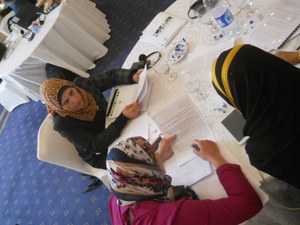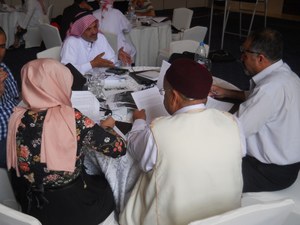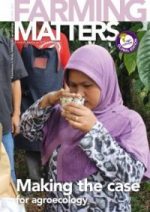In 2016, ILEIA conducted a workshop in Amman, Jordan, with the support of the European Union, Oxfam and IUCN-ROWA. This article describes some of the lessons from the workshop, where all participants, ranging from project staff to herders and Bedouins, engaged in a documentation and systematisation process and produced an article that will soon be published in a booklet.

Many interesting agricultural initiatives take place in the Middle East but few of these are shared in written form. As a result, there is a feeling that nothing much happens there, while the opposite is many times the case. To address this, a project involving practitioners from Jordan, the Occupied Palestinian Territory and Egypt was set up. As part of this project, between April and May 2016, a documentation workshop with participants from the three countries was organised. The goal of the workshop was to use a structured documentation process and produce articles that share lessons from pastoralists’ initiatives and experiences. Most of the participants had never published any of their written work before. Many had not even considered writing down their stories.The 24 participants were invited to join a ‘sandwich’ process: two workshops separated by an intermediate period back home. Participants prepared for the workshop with some introductory reading on documentation and by selecting an experience from their work as a case to describe and analyse in the workshop.
First things first
The first workshop started with a discussion around the general context of pastoralism in the Middle East – the difficulties to find relevant resources in Arabic, and the role that eld practitioners can have in filling this gap. Participants then looked at what documentation actually is, the main principles that shape a documentation process (e.g. that it is participatory), the main conditions needed (organisational support, a critical view), and the main barriers to documenting experiences.
Next, participants started their own documentation process. Based on a set of templates they started drawing clear boundaries around the chosen cases (identifying the area covered, the starting date and duration, the main objectives and the context in which the experience took place). Participants then described all activities and the results of their experience. A third session focused on the analysis, starting with selection of criteria that can be used to evaluate an experience (e.g. environmental impact or repeatability), and then identifying indicators to assess if these criteria were met. With clear criteria and indicators, participants went on to look at the underlying reasons, factors or conditions which contributed, in a positive or negative way, to the results of the experience.
A second meeting
“I always saw my experience as just a story. But now I see how special it really is”
Participants returned to the second workshop with a first draft of an article about their chosen case. This second meeting could best be described as a writeshop as the intention of each participant was to improve upon the first draft of their article. After an introductory session, the participants critically examined their own and their peers’ articles. The peer review process was a particularly valuable learning experience. Two rounds of peer revision took place: a first one with members of their own team, as people who knew about each experience and its context, and a second one with groups that were new to the documented cases. This second group helped to identify extra details needed to make the story understandable to an outsider.
The foundations of the documentation process made it easier to pinpoint where extra attention was needed. It became clear that a common pitfall amongst participants was that their articles were more descriptive than analytical.
Challenges and results

The positive attitude and interest shown by all participants helped enormously. But it was not easy to run a workshop in both Arabic and English, requiring continuous translation and switching of languages. Facilitating a workshop in a foreign language is always a challenge, but it becomes even more complicated when writing is involved as it was impossible to provide quick feedback. In this setting, the (guided) peer review sessions became even more important.Working towards a written output such as published articles provides an incentive to keep working on the documented cases, even if engaging in a critical process is confronting. Moreover, writing helps people see the significance of different aspects of their work. As one participant said, “I always saw my experience as just a story. But now that I have written it down, I see how special it really is.” Publishing written work gives the authors and their work recognition, and it allows them to share their experiences on a global scale.
Many participants had never met other herders from neighbouring countries. This workshop showed that they could learn from each other. It also showed the advantages of a documentation process to raise their own and other herders’ voices, and make them heard.
Documentation and systematisation?
The terms ‘documentation’ and ‘systematisation’ are often used interchangeably. Although, documentation is used in this article, systematisation more aptly captures the whole meaning: a process which seeks to organise available information on an experience, analyse it in detail to understand what and how it happened, draw conclusions which will help generate new knowledge, and present this new knowledge in an appropriate, shareable format, for instance as an article. Systematising experiences through well written articles is one way of demonstrating impact. Such an article provides evidence of what works and what doesn’t and enables the reader to draw lessons from others’ experiences. The process of analysis and writing also enables the writer to draw lessons from their own experiences.
Laura Eggens (lauraeggens@yahoo.com) and Jorge Chavez-Tafur (j.chavez.tafur@gmail.com) worked as consultants for ILEIA.
This article is part of the visibility and communications work being carried out under the framework of the Food Security Governance of Bedouin Pastoralist Groups in the Mashreq Project, funded by the European Union. The contents of this article are the sole responsibility of ILEIA and can in no way be taken to reflect the views of the European Union.

